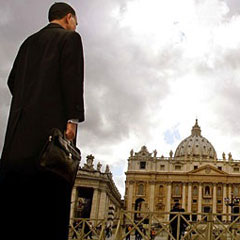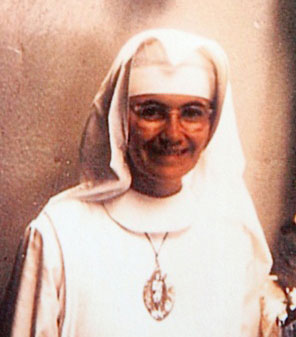Professor Paul Mullen is probably very gifted in Forensic Health, but his grasp of Catholic theology ain’t great.
He has suggested that clerical celibacy is a discipline not a dogma. So far so good.
He says clerical celibacy has financial implications:
“I’ve have heard a Catholic bishop say that the reason celibacy is maintained is that they could not afford to pay priests, they couldn’t afford to pay them pensions, they couldn’t afford to pay them enough if they had a wife and children.”
Yep. Wouldn’t dispute that.
But according to the press, he also says “celibacy has no basis in theology.” (Now I don’t know if he actually said that. It’s only what the media has reported. They’re not always the same thing.)
This is wrong. There is a theological basis to clerical celibacy. And even if Pope Francis relaxed the requirement of clerical celibacy tomorrow, that theological basis is not negated.
“For there are eunuchs who have been so from birth, and there are eunuchs who have been made eunuchs by men, and there are eunuchs who have made themselves eunuchs for the sake of the kingdom of heaven. He who is able to receive this, let him receive it.” (Mt 19:12.)
These are our Lord’s own words. So to start with, we can dispense with the idea that clerical celibacy is unnatural and displeasing to God (or at best, God is indifferent). Jesus himself sets us straight. “Anyone who is able to live this calling, live it!”
Jesus himself was a eunuch for the sake of the kingdom. His celibacy was counter-cultural. A rabbi was expected to serve God by marrying and bringing up children. But our Lord didn’t do this. Why?
For starters, Jesus knew his mission would culminate in premature death. How could he, in good conscience, expose a wife and children to destitution? (Financial implications again! I’ll come back to that.)
But more importantly, our Lord’s celibacy also speaks to the very meaning — the very theology — of marriage, not to mention ecclesiology (the theology of the Church).
1. Theology of marriage.
Man alone is incomplete. Woman alone is incomplete. But in marriage, the two become one and they are more complete. The very etymology of “sex” speaks to this. Put another way, man alone is an image of God. Woman alone is an image of God. Man and woman together is a more perfect image of God.
“So God created man in his own image, in the image of God he created him; male and female he created them.” (Gen 1:27)
The nuptial union signifies the promise which awaits each of us in eternity, when our incompleteness is perfectly resolved by our union with God. As St Augustine famously observed, “You have made us for yourself, O Lord, and our heart is restless until it rests in you.”
Jesus, of course, is an exception to this. Unlike the average Adam, Jesus is already complete. Marriage cannot complete him, because he is already the perfect image of God. Jesus is God. It could be argued that it wouldn’t make theological sense for Jesus to marry.
2. Theology of the Church.
Jesus’ celibacy also has ramifications for the Church. Christ is the bridegroom; the Church is his bride. He consecrated himself to all of us equally, which precludes an exclusive married relationship. In the same way, priests who are celibate consecrate themselves to the Church, which precludes an exclusive married relationship.
Moreover, “eunuchs for the kingdom” — be they clerical or lay, male or female — witness to God’s love just as husbands and wives witness to God’s love. Marriage is sacramental. The love and shared life of spouses is a material expression of the nuptial relationship between Christ and his Church. Celibacy is not sacramental. But it is a prophetic sign of what awaits us in eternity.
So it seems our Lord’s celibacy had practical implications, and theological ones. As it is for Jesus, so it is for the Church. There are financial implications in the discipline of clerical celibacy. But there is also a theological basis.
At its most basic, and speaking personally now, I’m celibate because Jesus was celibate.
The Victorian Parliamentary Inquiry
Incidentally, Professor Mullen’s remarks were made at a hearing of the Victorian Parliamentary Inquiry into Child Abuse. I attended one of these hearings a few weeks ago. I’m glad I did. It’s important, I think, to listen to abuse survivors. Not only in the name of justice, but also in the name of healing. Survivors have insights which can heal the whole Church, not to mention wider society.
I too easily tire of the media coverage of the clergy abuse scandal. The darkness is overwhelming. It almost threatens to choke one’s faith in goodness and humanity.
Attending the Inquiry itself was a different sort of experience. It actually increased my faith in goodness and humanity. Hearing the stories was still torturous, but hope prevailed. The courage of survivors and whistle-blowers evoked the words of St John.
The light shines in the darkness, and the darkness has not overcome it. (Jn 1:5)






I read that article in The Age. Mullen started by saying that the highest offenders when it comes to abuse of a minor were young men; he made calls for teenage education that aimed to point out how unacceptable such behaviour was.
The article then has him saying, completely out of context it seems, that “Getting rid of clerical celibacy would reduce child sexual abuse”. You document the rest.
I was dumbfounded at his comments that clerical celibacy had no theological basis. Not his conclusions so much as the sheer audacity that he felt he had the authority to make those claims.